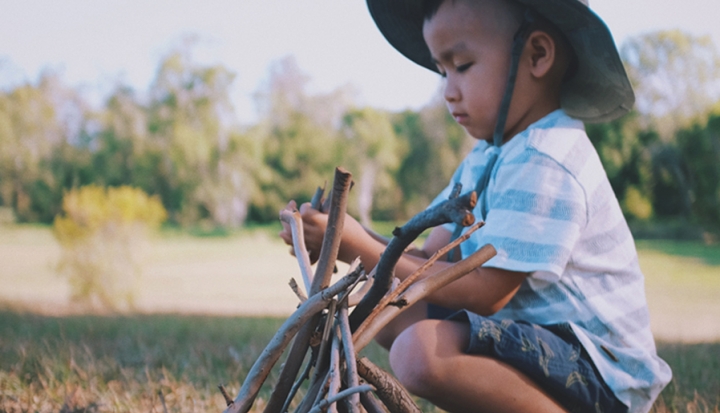Some of the stones skipped like children across the surface of the lake. A few landed with a single, splashy plop. Others cut smoothly right through with barely a sound or splash.
Three children—my 5-year-old and my friends’ two kids, 7 and 10—waded up to their shins in a small clearing on the banks of the bay, tossing rocks and laughing, challenging each other to farther throws, bigger rocks, more skips. Gentle waves lapped at their skinny, mosquito-bitten legs.
Their parents—my husband and I, my friend and her husband—watched in amusement as we enjoyed the company, the soothing quiet relative to the city noises we’re far more used to, and the warm late-summer air.
My family camped in a state park in late August, during summer’s last gasps before the warm and sunny days dissolved into a crisp autumn. It was meant to be a much-needed family vacation away from it all, an opportunity to have some fun before our son started kindergarten.
And it was. We rested in the hammock, read books by flashlight, hiked and biked, and made our fingers and faces sticky with toasted marshmallows and melted chocolate.
But the trip did something else. It changed us. While our minds and muscles were nourished and restored by the rhythms of sunrise and sunset, of brilliant, warm light and Cimmerian absence of it, we were made intensely aware of our spiritual entanglement with all of creation.
Our son collected sticks and skipped rocks. He stayed up to watch his first sunset, the sky shifting from flamingo pink to fiery orange to royal purple, and to stargaze for the first time at diamonds against a black velvet sky.
He sang as he hiked (the song of the summer seemed to be “Old Town Road”) and clung to me quietly as we bobbed across the waves to an island accessible only by boat, where we biked through a forest, inhaled the fragrant air of a lavender farm, and warmed our faces in the sun while enjoying the local gelato.
This summer, together my family marveled at the sheer abundance of the natural world—as well as the staggering losses it has endured in such a short span of time.
We learned that the brown bat population of northern Wisconsin has declined by as much as 90 percent in just a decade. The loss doesn’t simply mean fewer bats. The nocturnal flyers help keep pests like mosquitos and crop-eating insects under control. Fewer bats translates into more bugs, which translates into more expensive—financially and ecologically—pesticides for farmers.
We were reminded that to cook dinner, we could not merely flick a switch and have heat. Nor could we build a fire and be ready to cook over it. The fire needed to be burning for at least an hour, preferably two, before the embers were hot enough to cook the salmon, brats, or foil-wrapped potatoes.
Our bundle of firewood was used up by the end of each night, a reminder that our fuel supply is not infinite.
The firewood we purchased was from trees that had to be cut down thanks to the emerald ash borer that has plagued forests all over North America. We witnessed the evidence of the invasive species and its effects on the delicate ecosystem of the state park in the maze-like tunnels left behind in the wake of the beetles.
The ash trees ravaged by the insects are essential to Native American communities as well as bird species that make their homes among the branches.
No doubt every other PBS Kids show has espoused the virtues of reducing, reusing, and recycling, but this is ultimately entertainment and cannot show children how all of creation—bugs and berries, great oaks and wispy dandelions, lumbering black bears and skittering chipmunks—lives a holy communion.
We cannot expect children to learn to respect the intricate dances of flora and fauna, of air and soil and lake, without experiencing them firsthand, without having their very spirits stirred.
The natural world is not a world apart from us. As humans, we do not sit upon thrones above it all. We are blessedly mixed up in all its beauty. And it is our responsibility to heed its balance with care and awe. A week of summer camping, of stone throwing, marshmallow toasting, and everything in between, taught us that.
Even at 5 my son seemed to absorb this lesson. The day after we returned home to our condo in the city, my husband took our son to the playground and observed how he separated the plastic from the wrapper of a packet of seaweed snacks and walked across the park to dispose of each in its proper bin.
(Lest you think I relay this story with smugness, please know that we are still desperately trying to get him to “save some water for the fish” in all manners of handwashing, toothbrushing, and toilet flushing.)
Not sure where to start with your own family? Spend some time together in prayer outside and marvel at all we have and all we have already lost. Sing praises with the trees that turn to gold in autumn’s sun. Let your heart lament our polluted water supply alongside the river, the lake, the ocean. Let your prayer be a request for guidance, for wisdom, for mercy.
We all need to adapt our ways to accommodate the results of a rapidly changing climate. Our children are depending on us. We are depending on them. The entire world, not just humans, needs all of us.
This article also appears in the November 2019 issue of U.S. Catholic (Vol. 84, No. 11, pages 43–44). Click here to subscribe to the magazine.
Image: Unsplash cc via Bambi Corro















Add comment